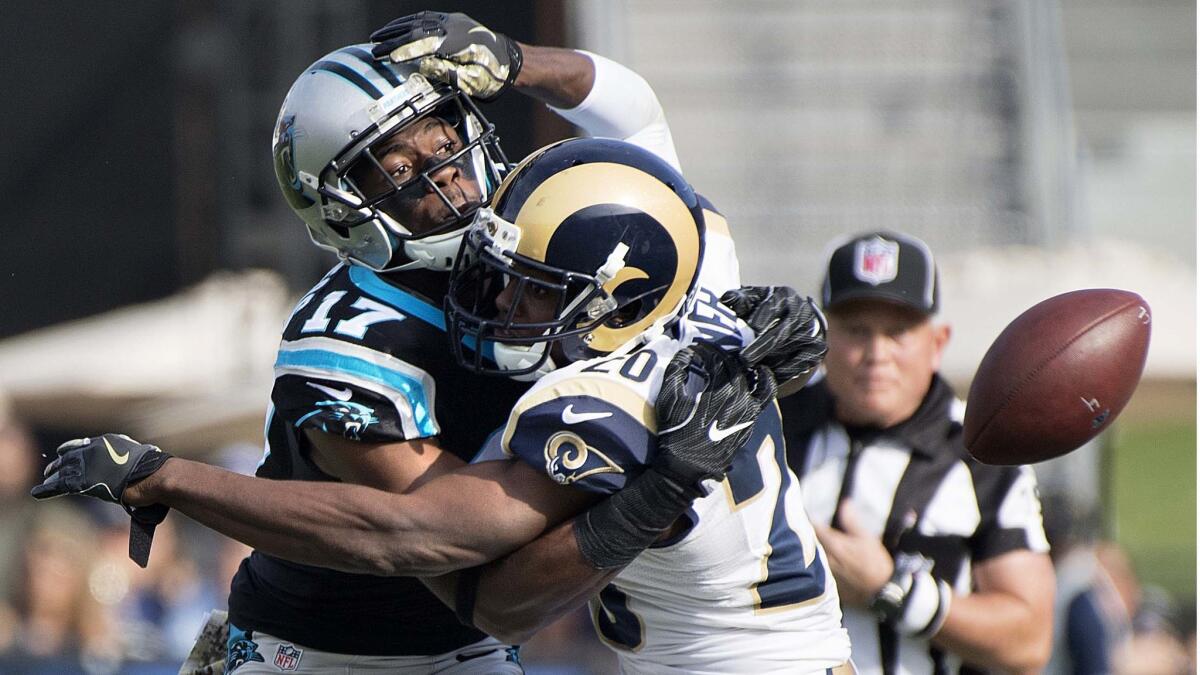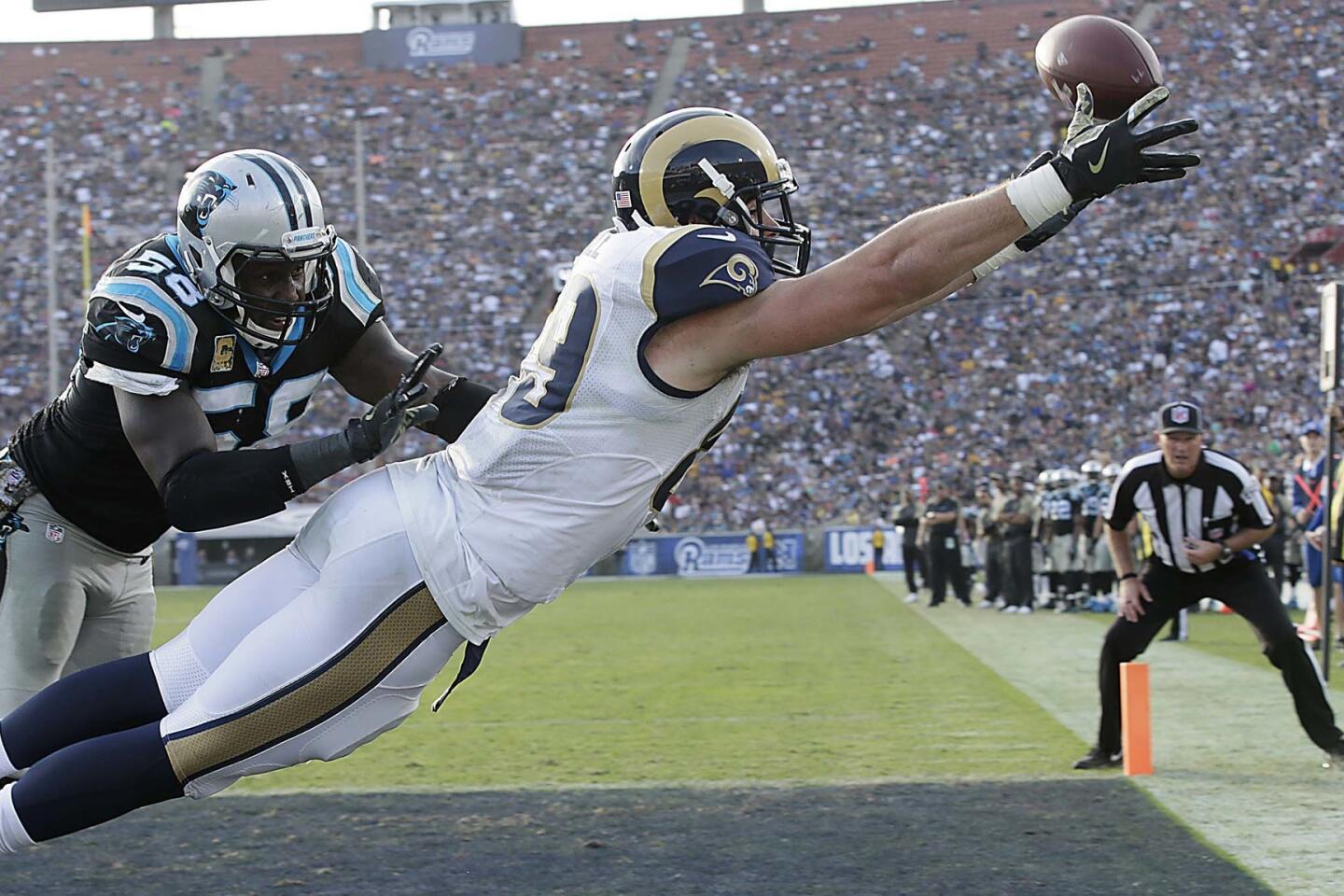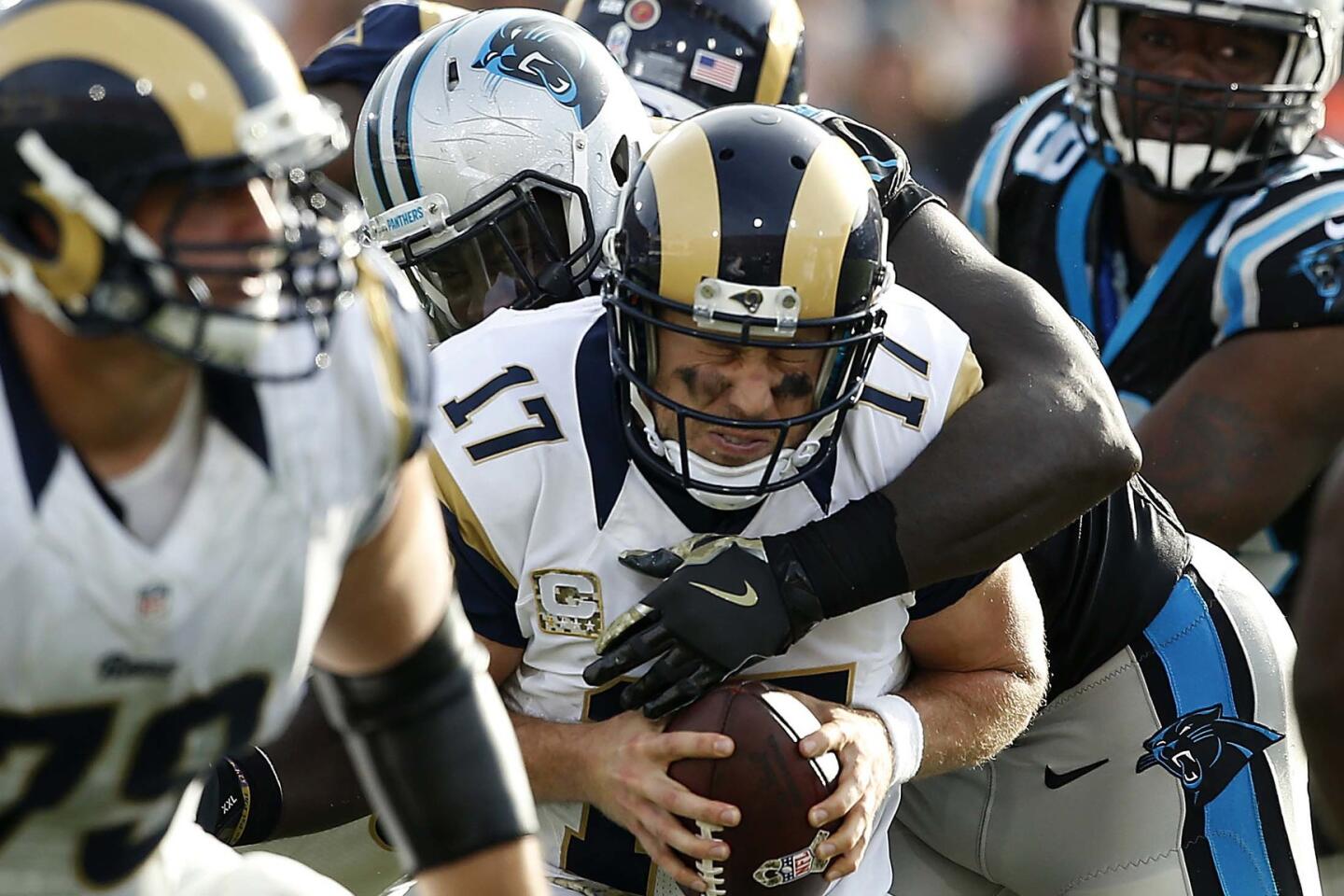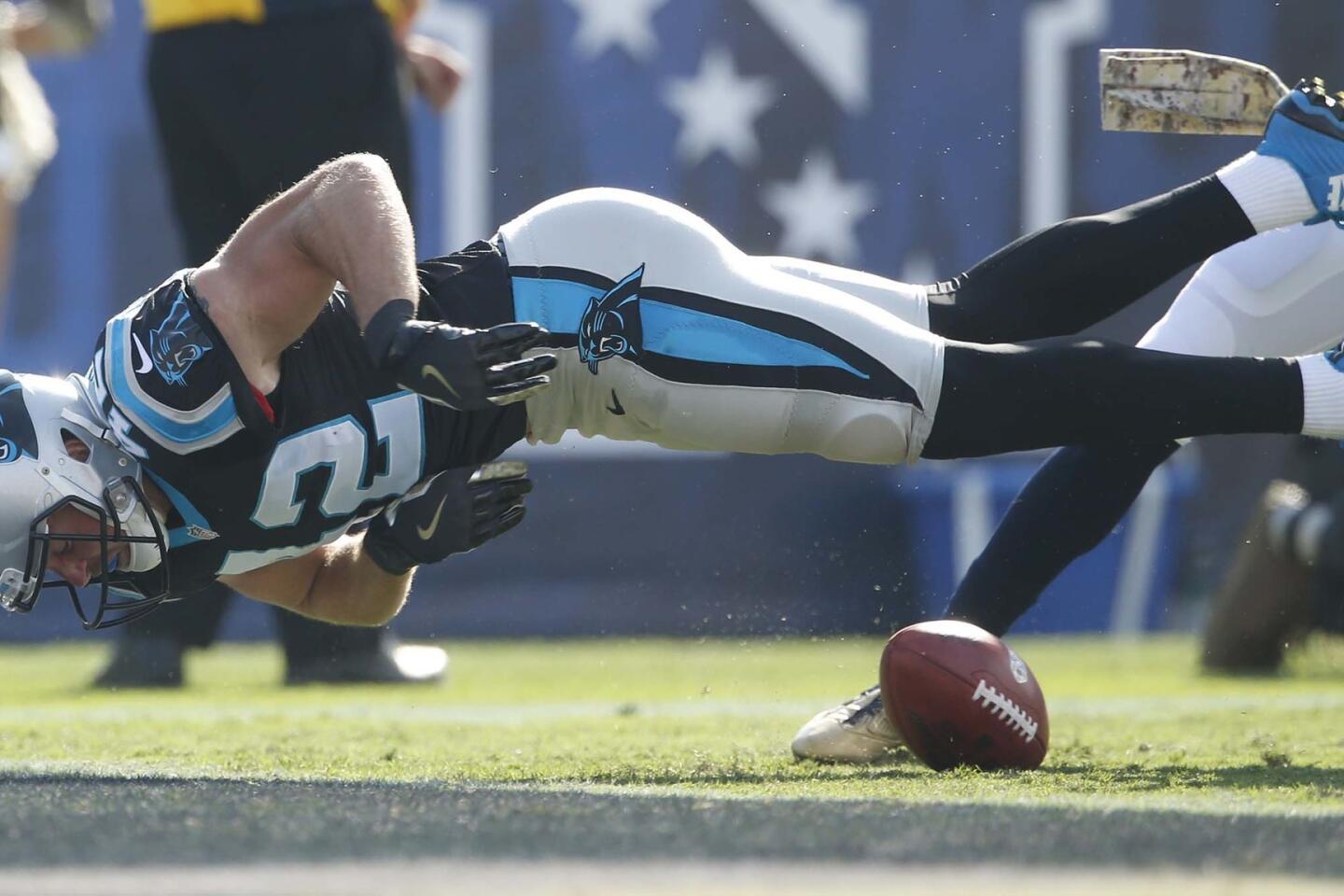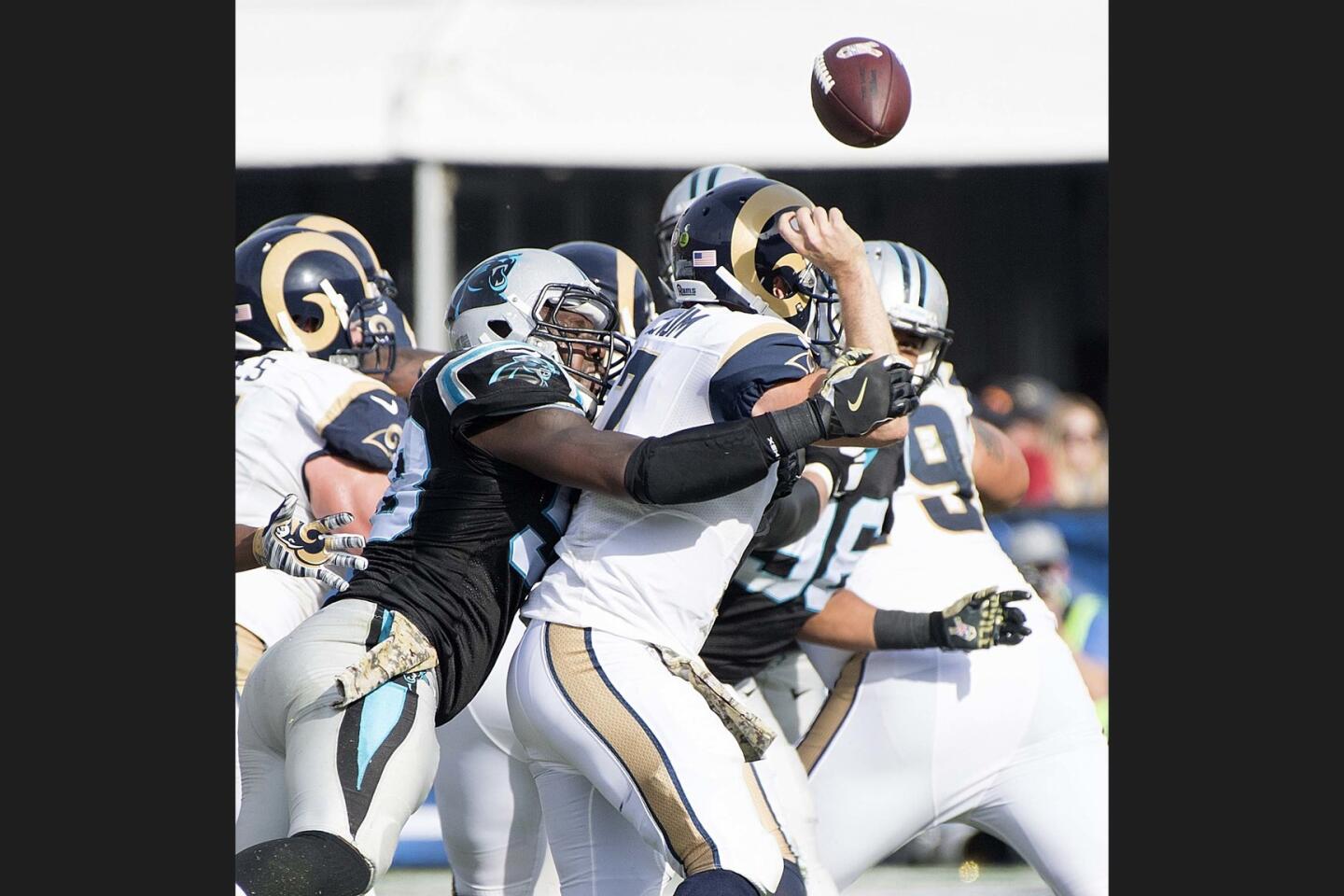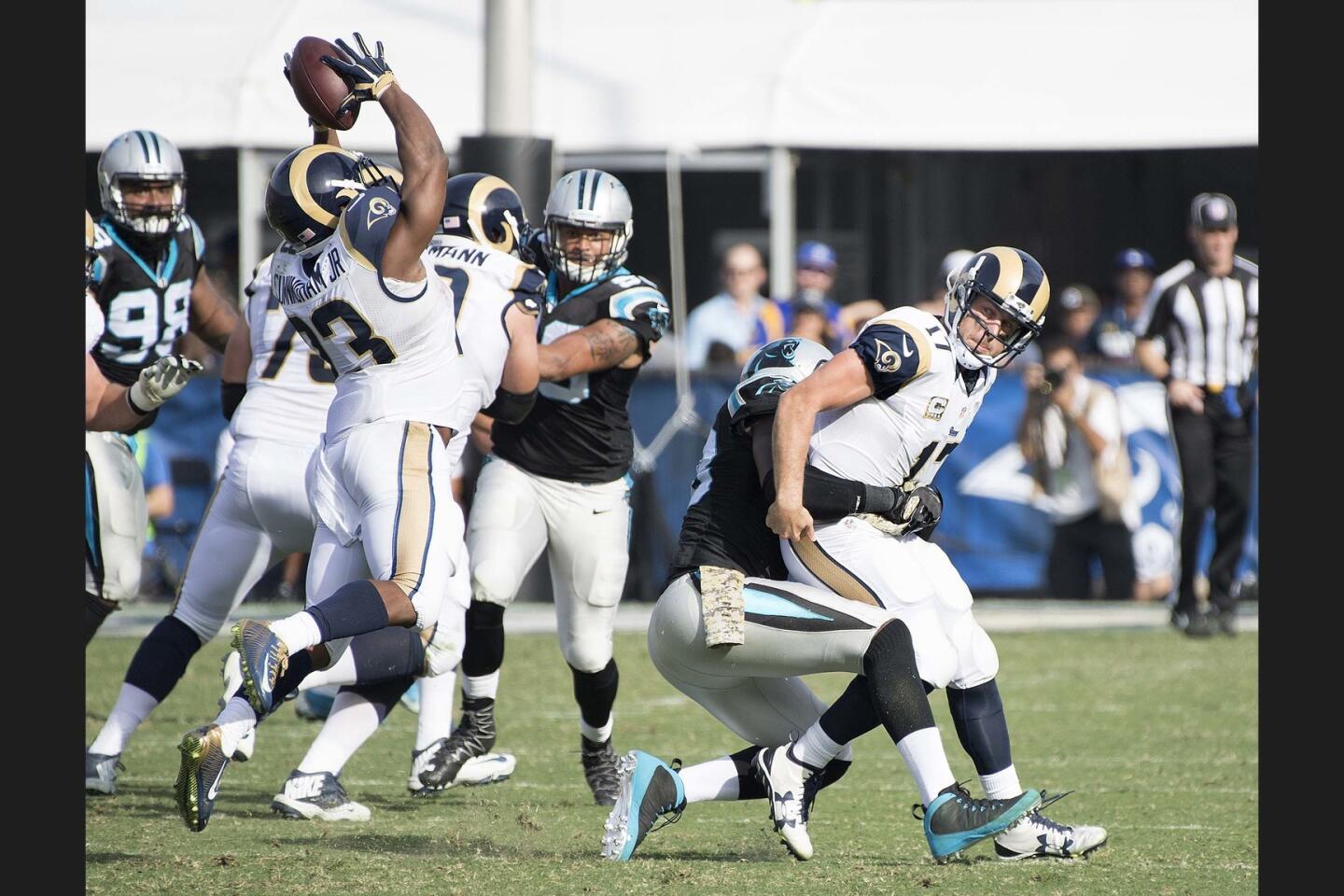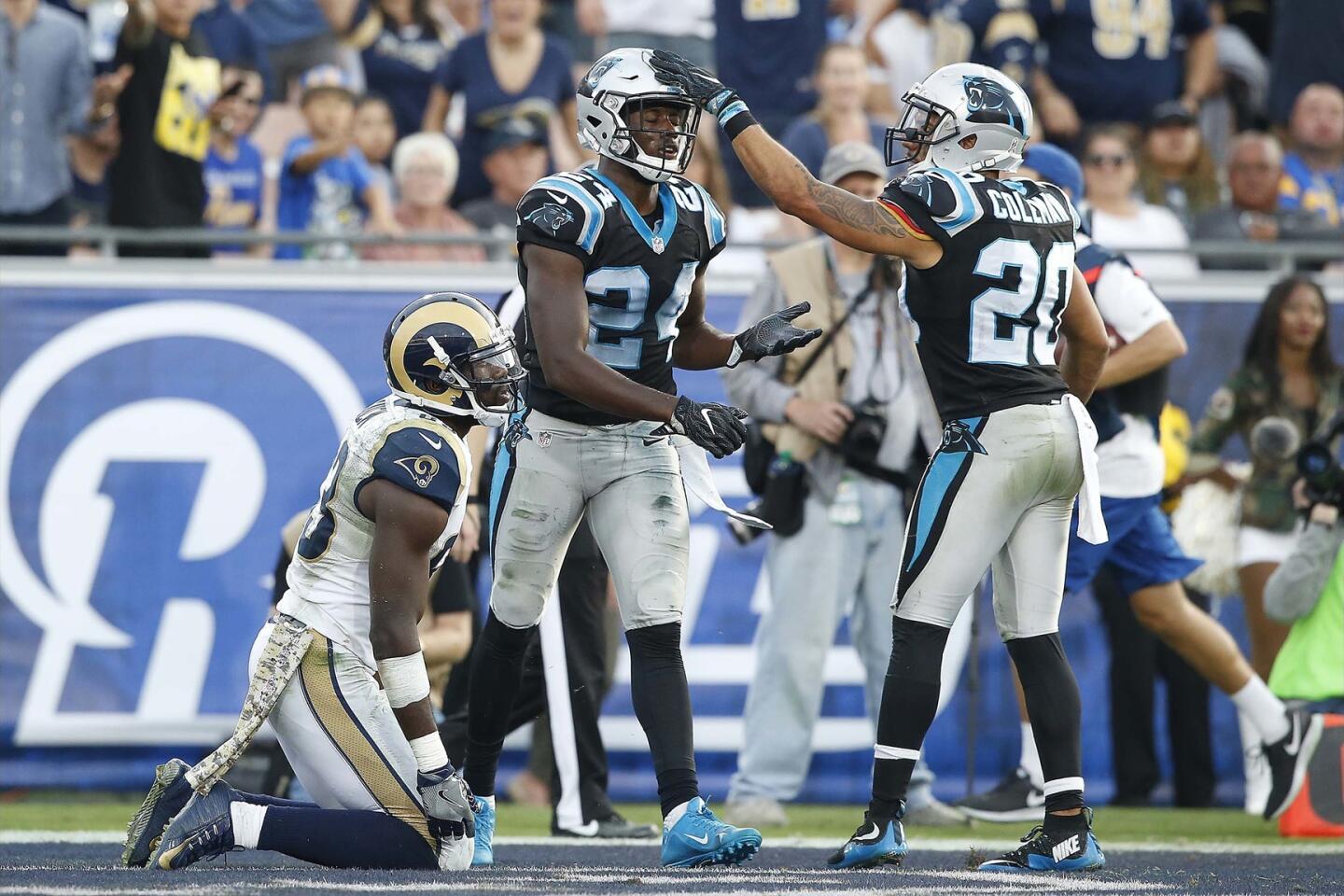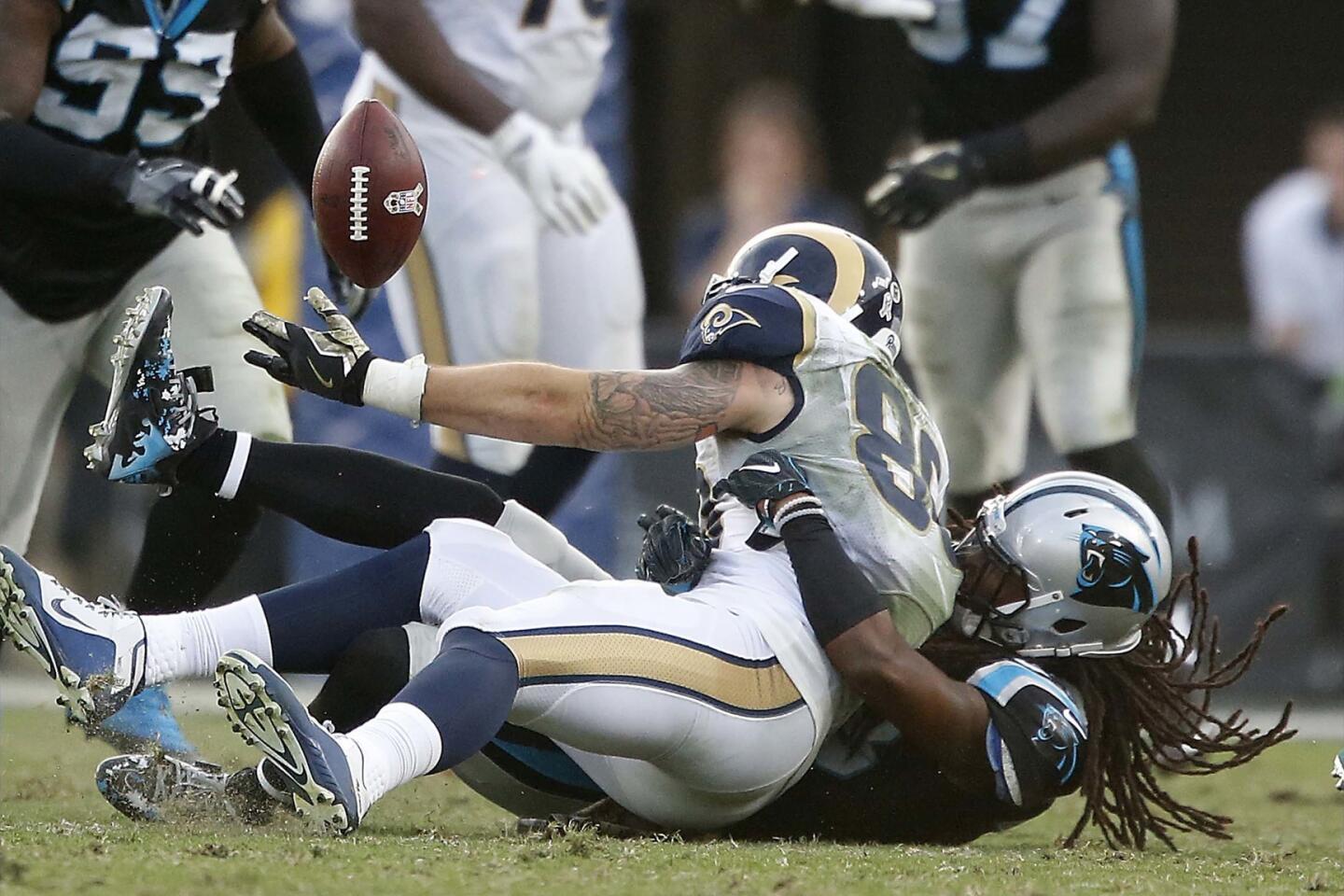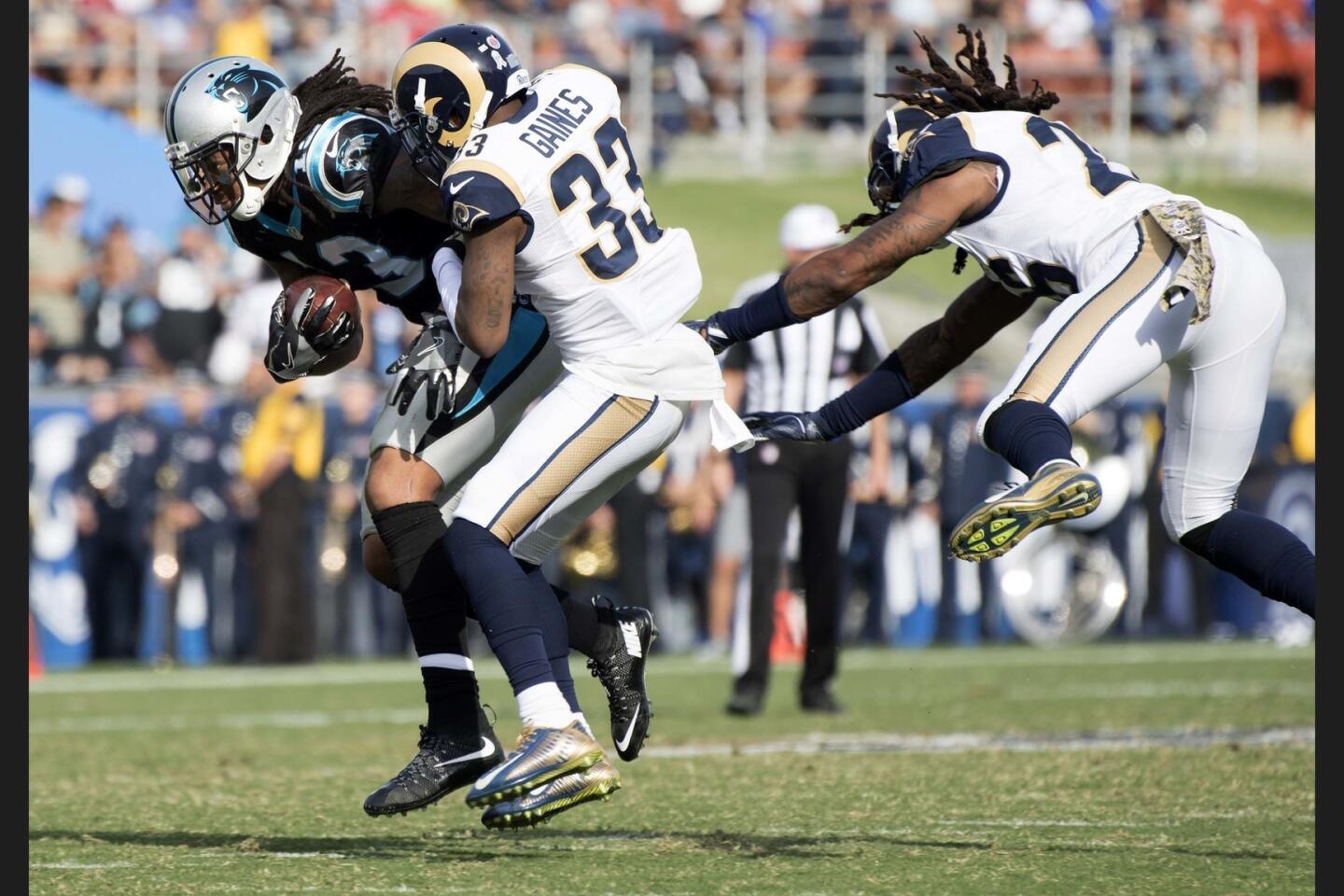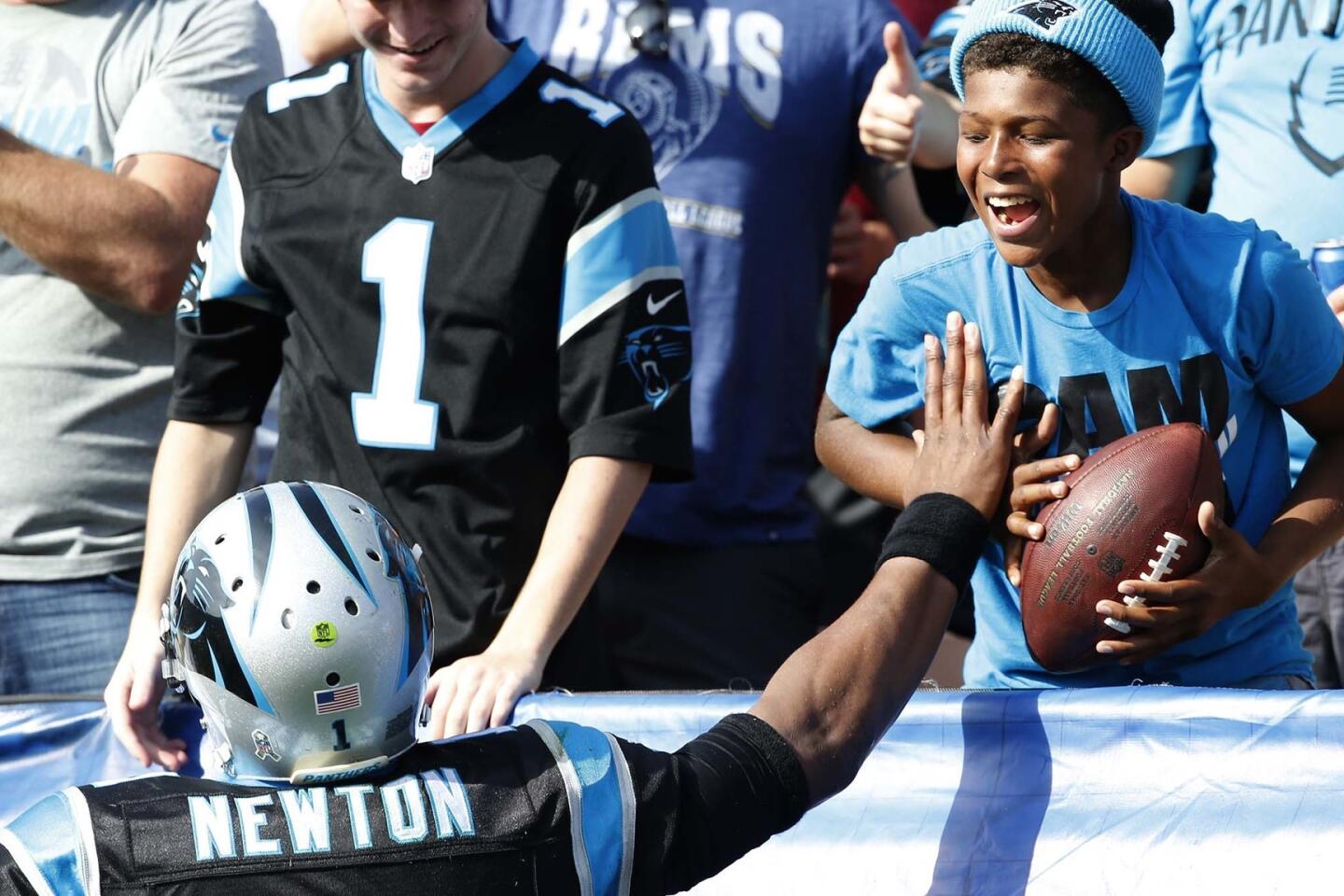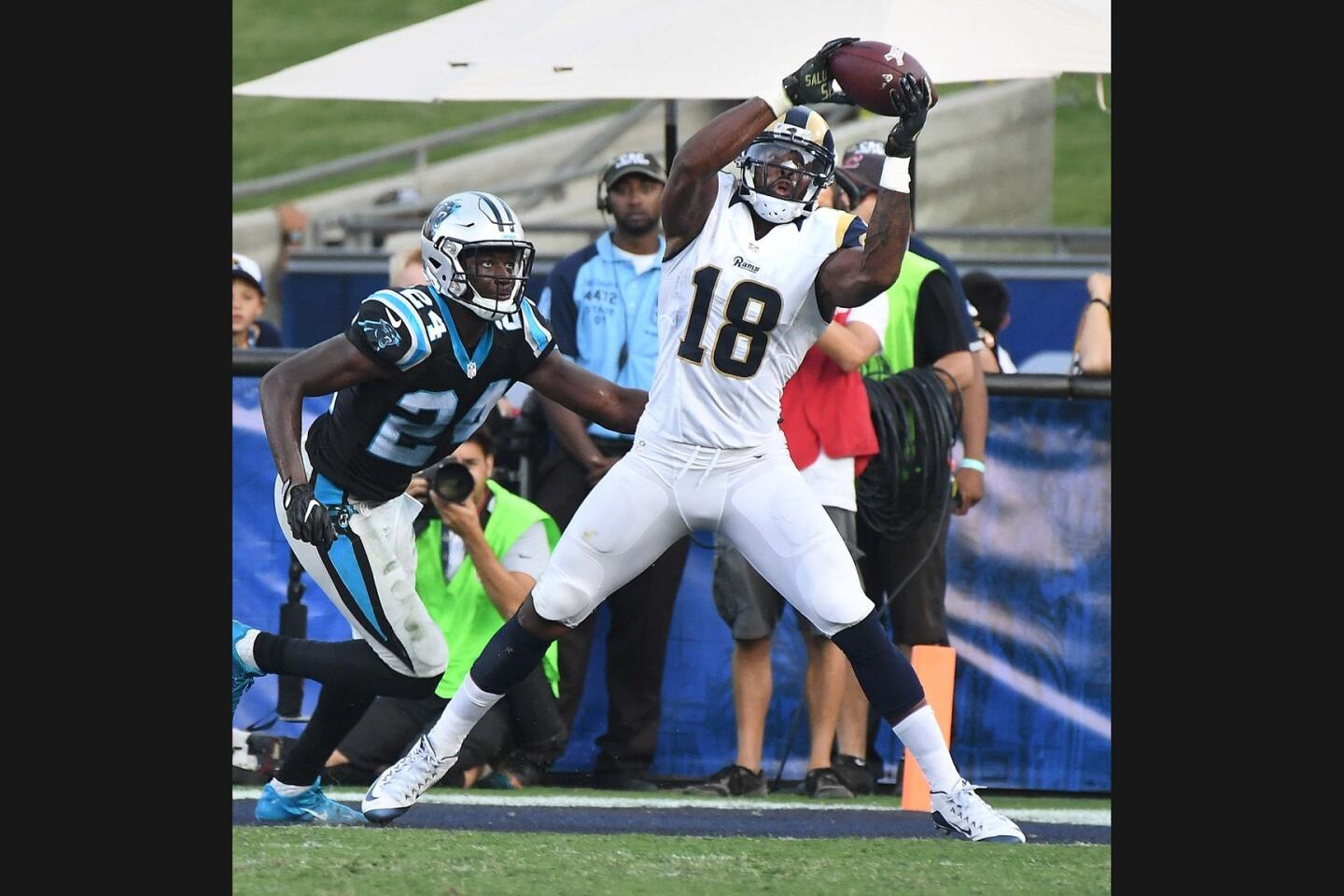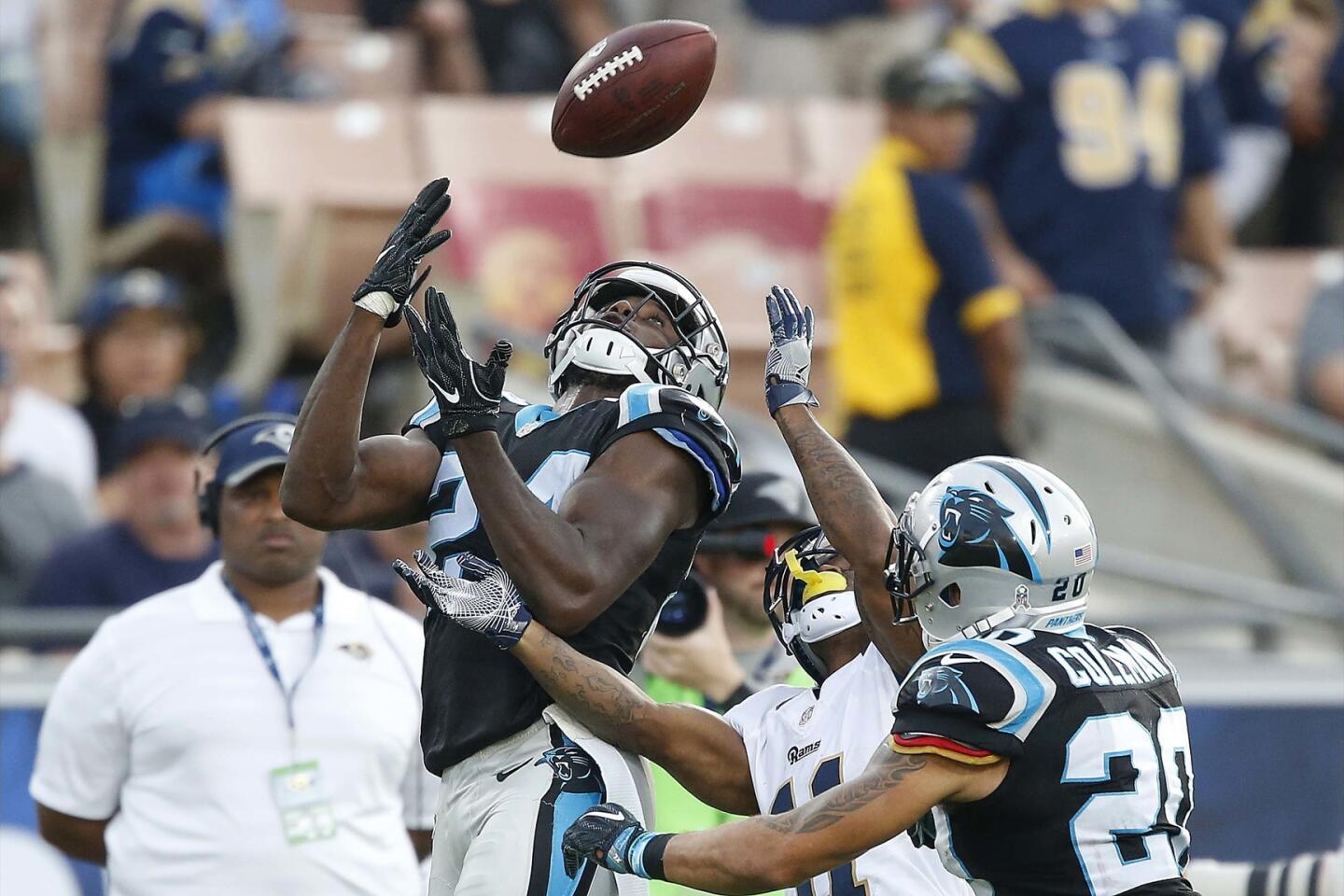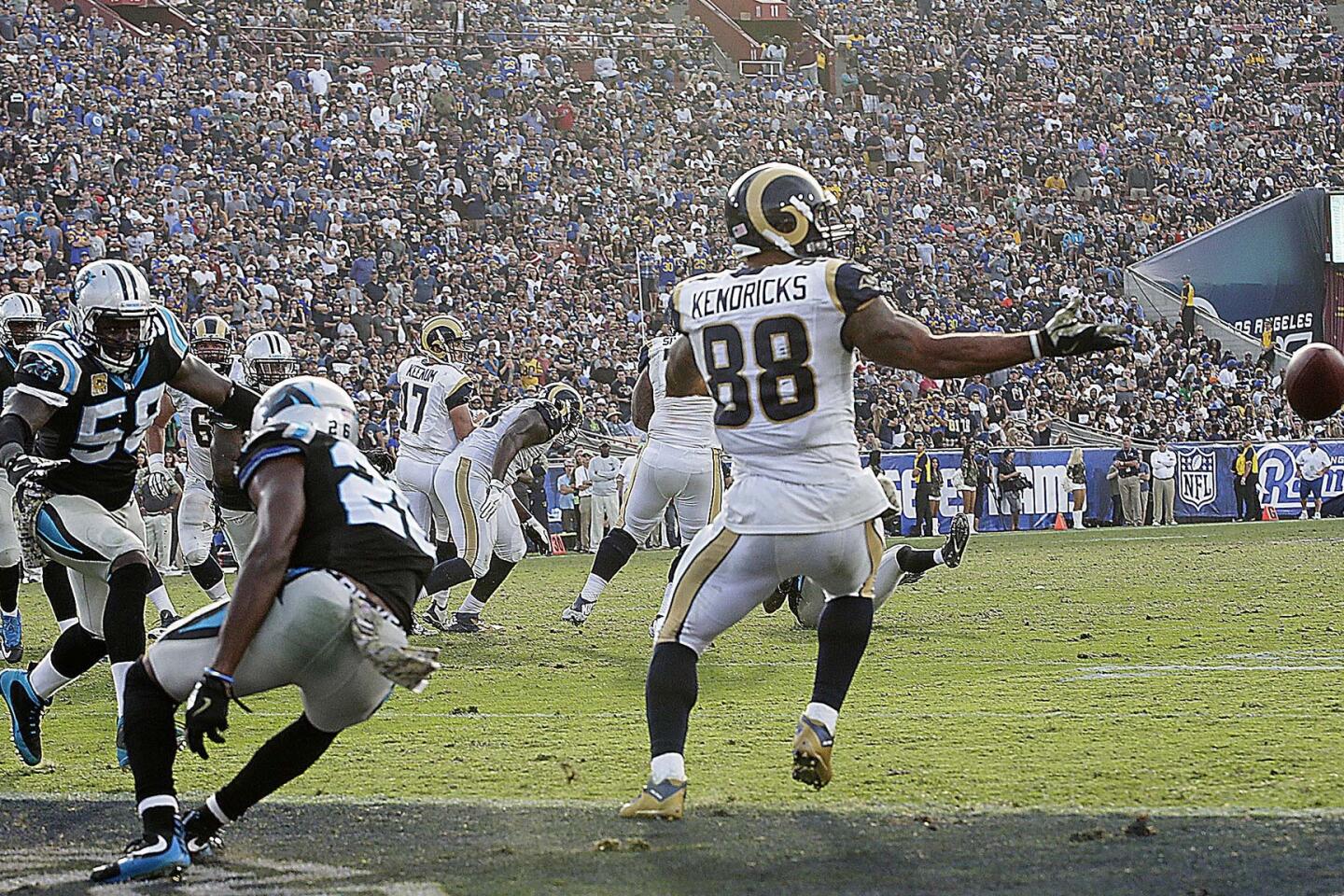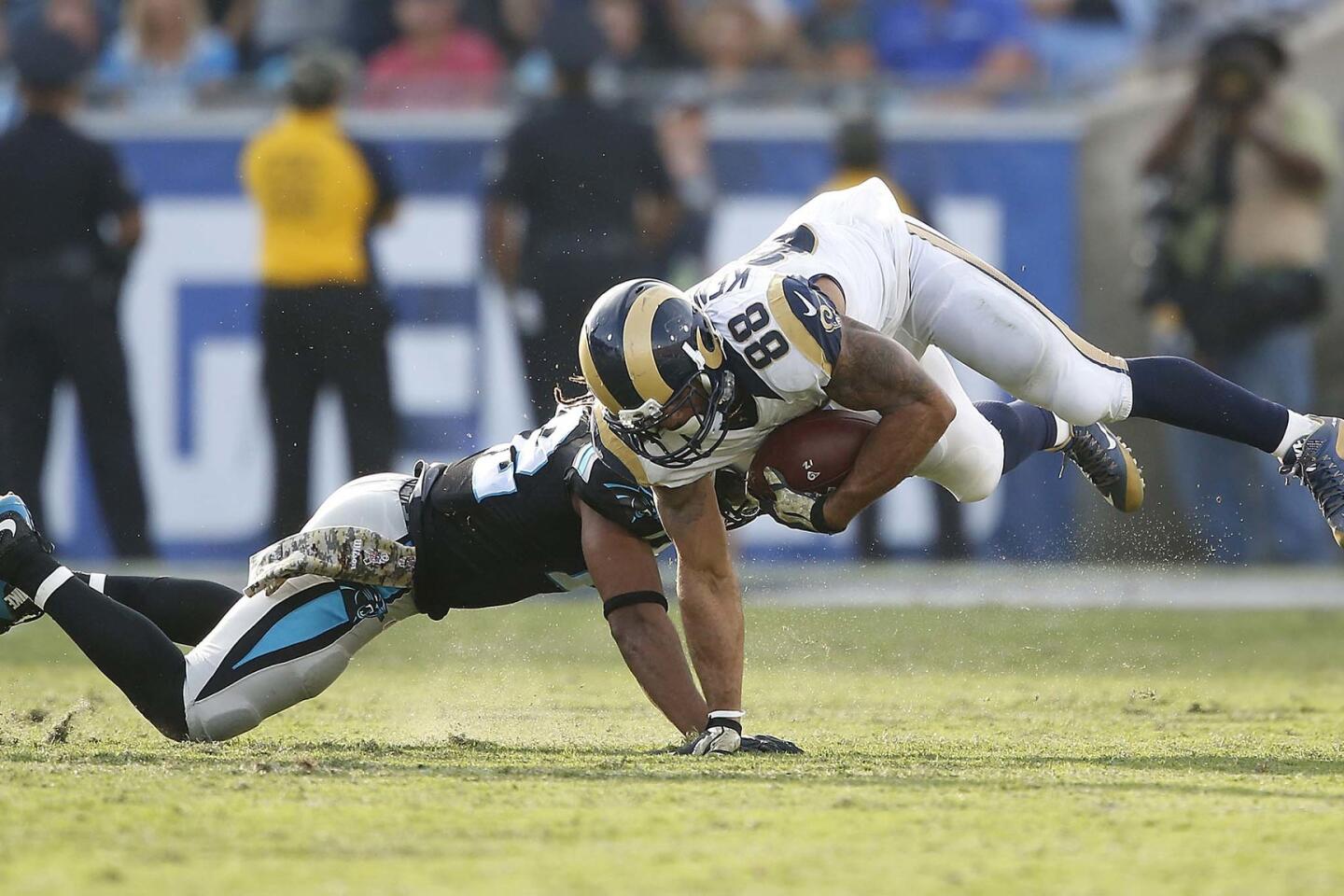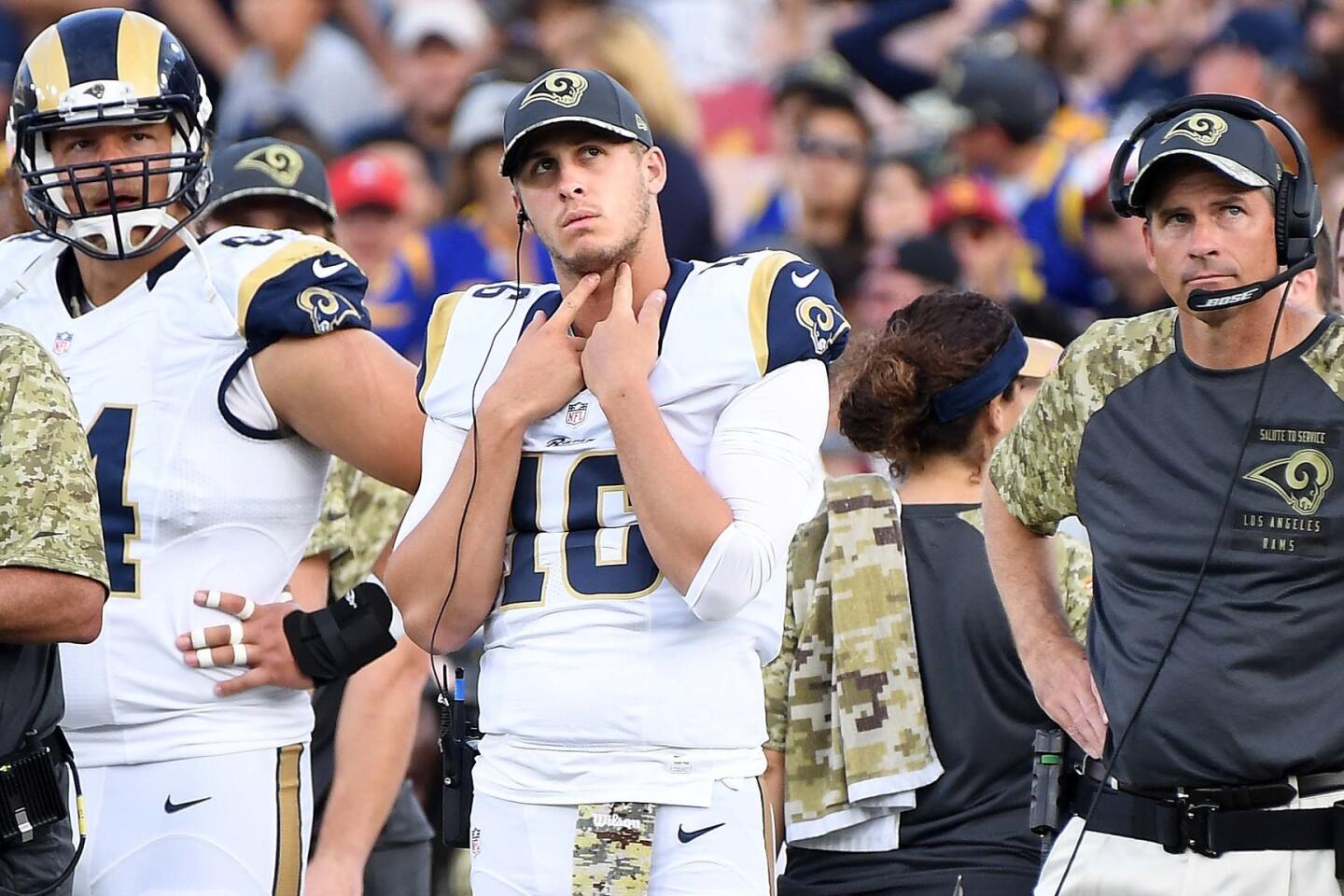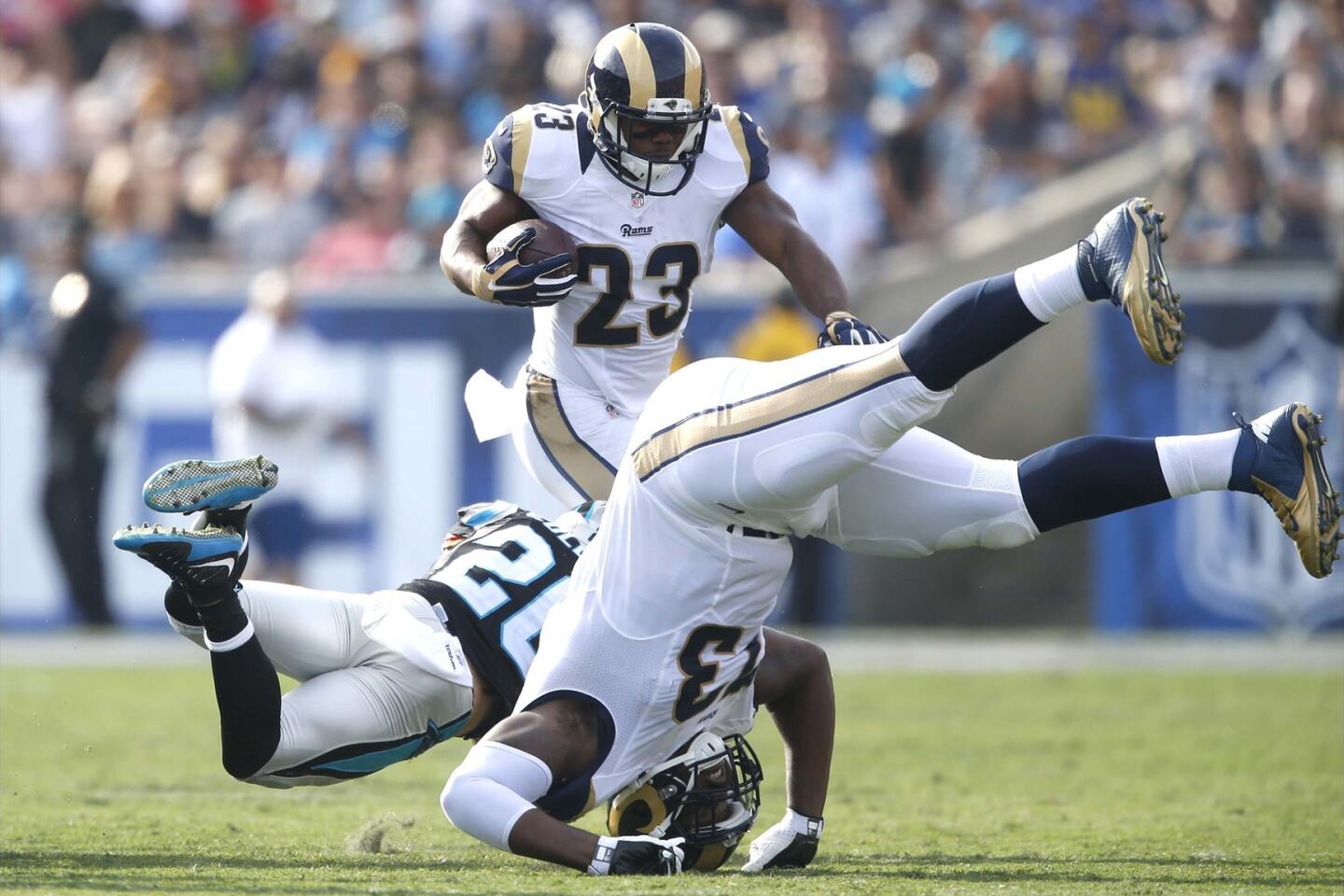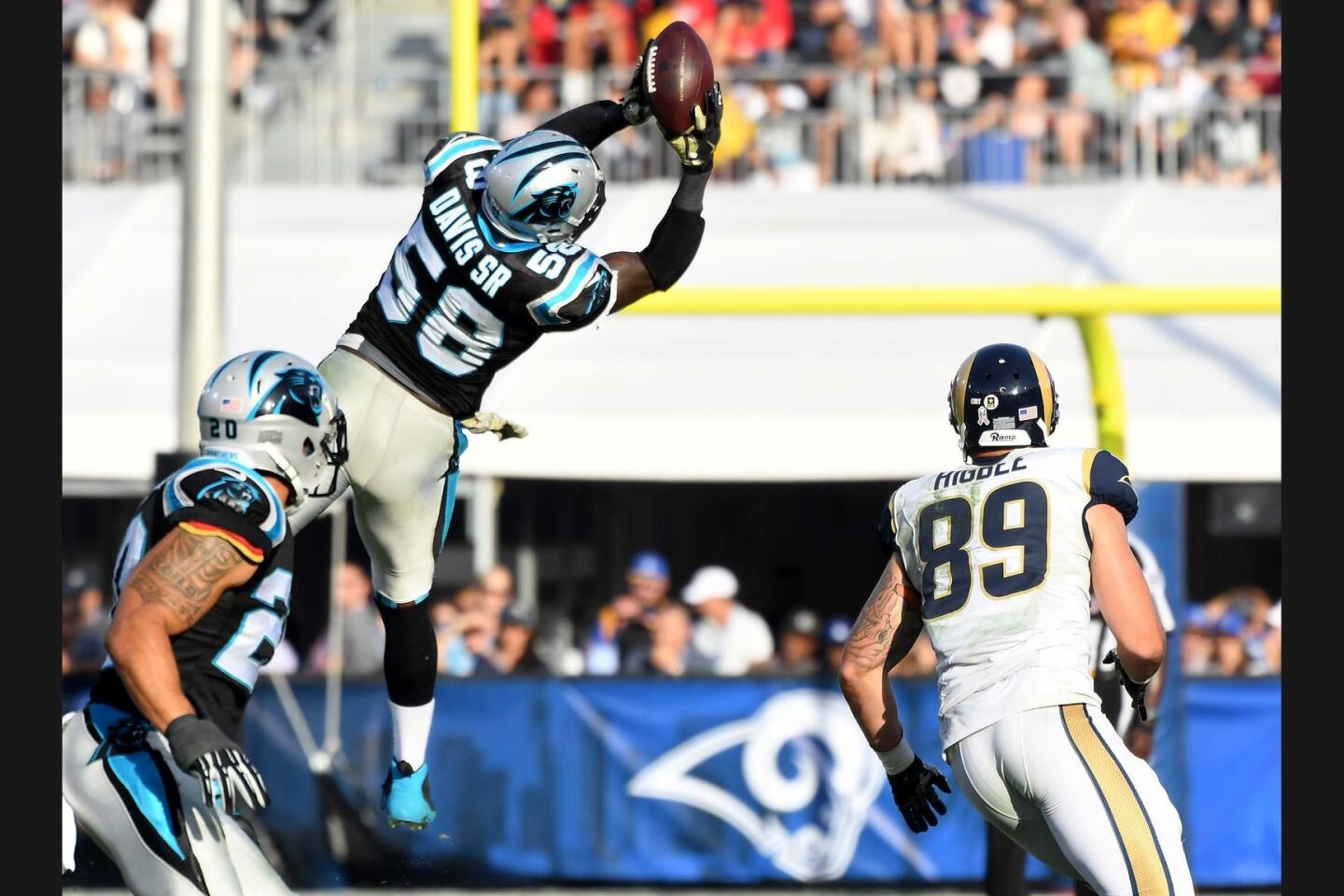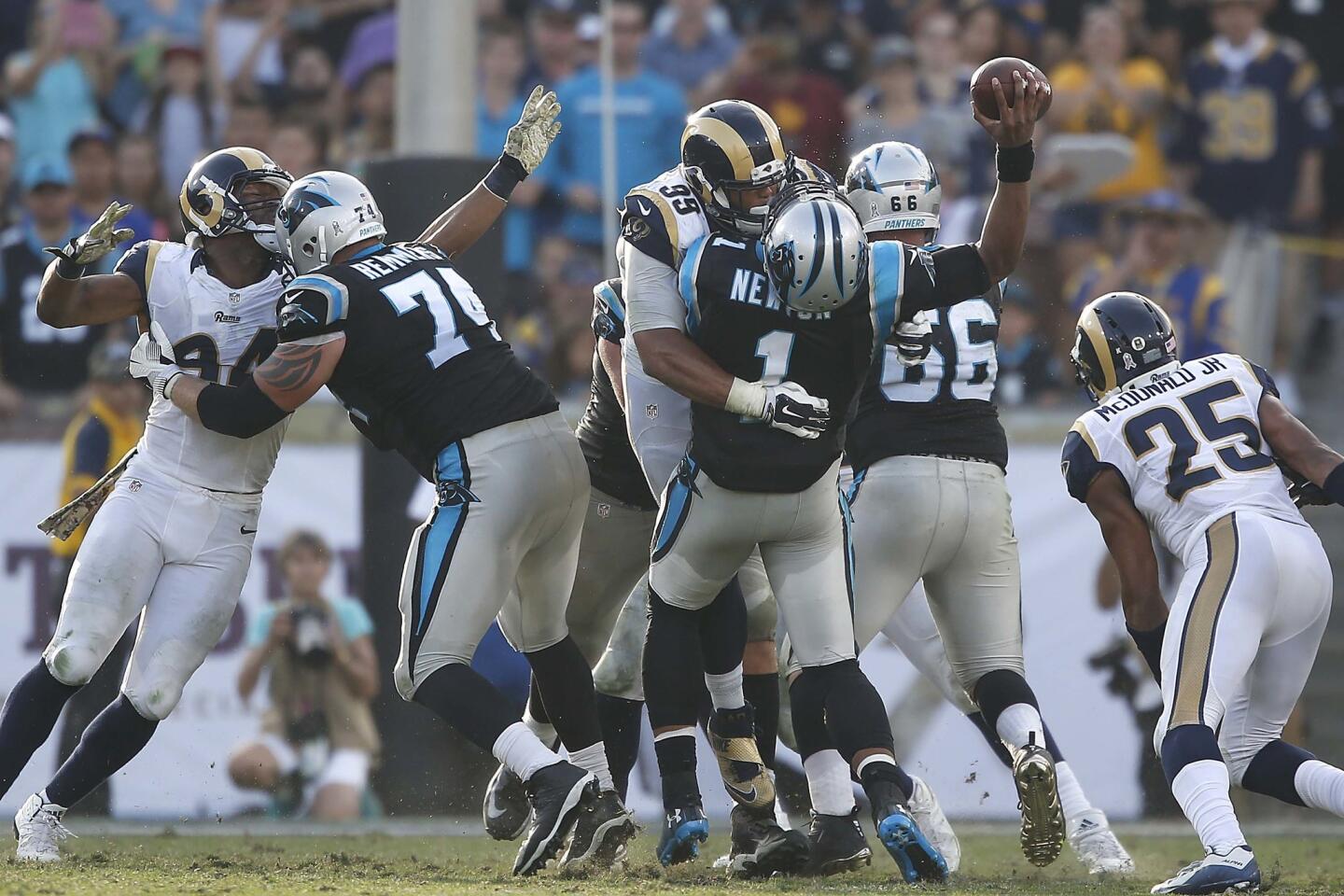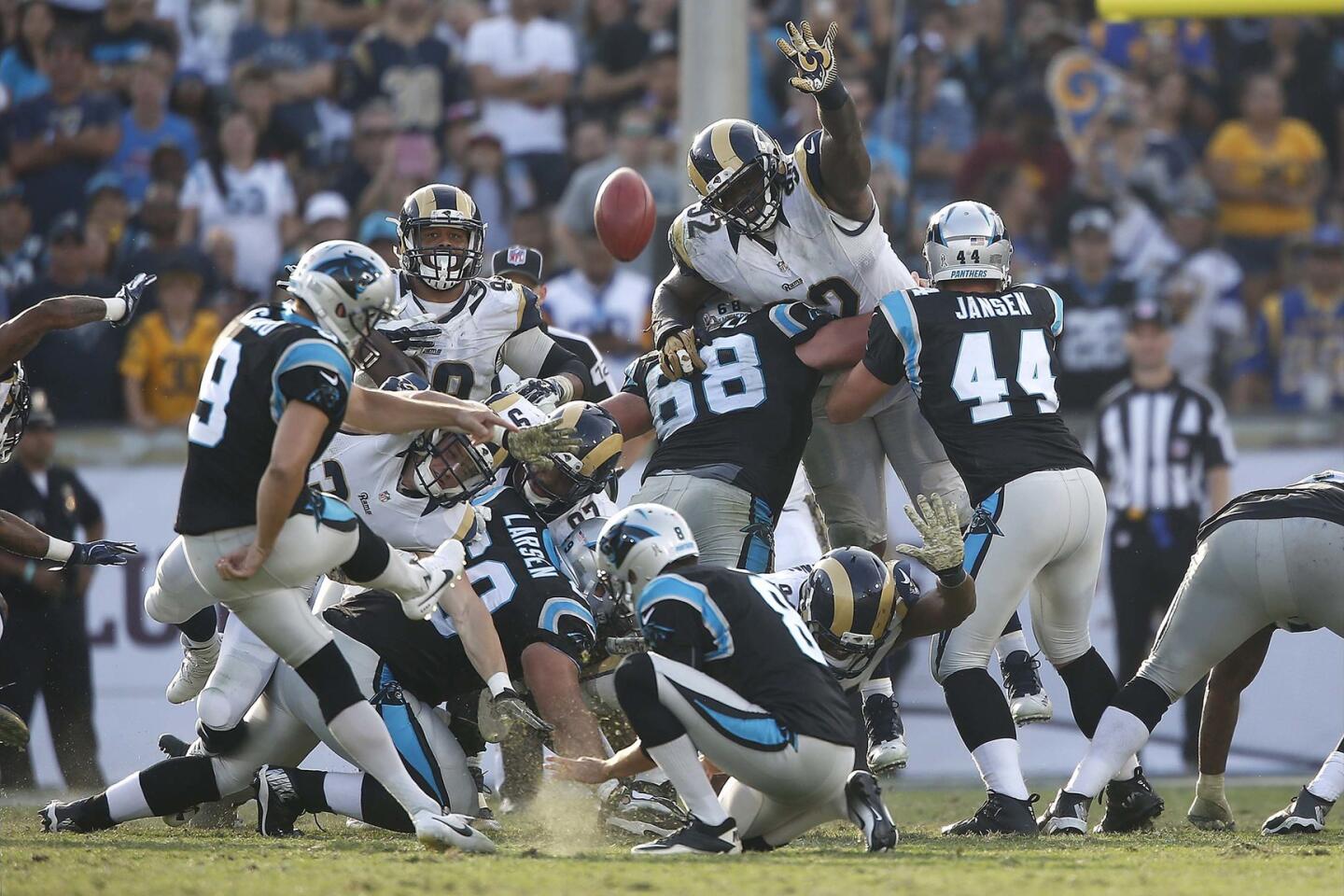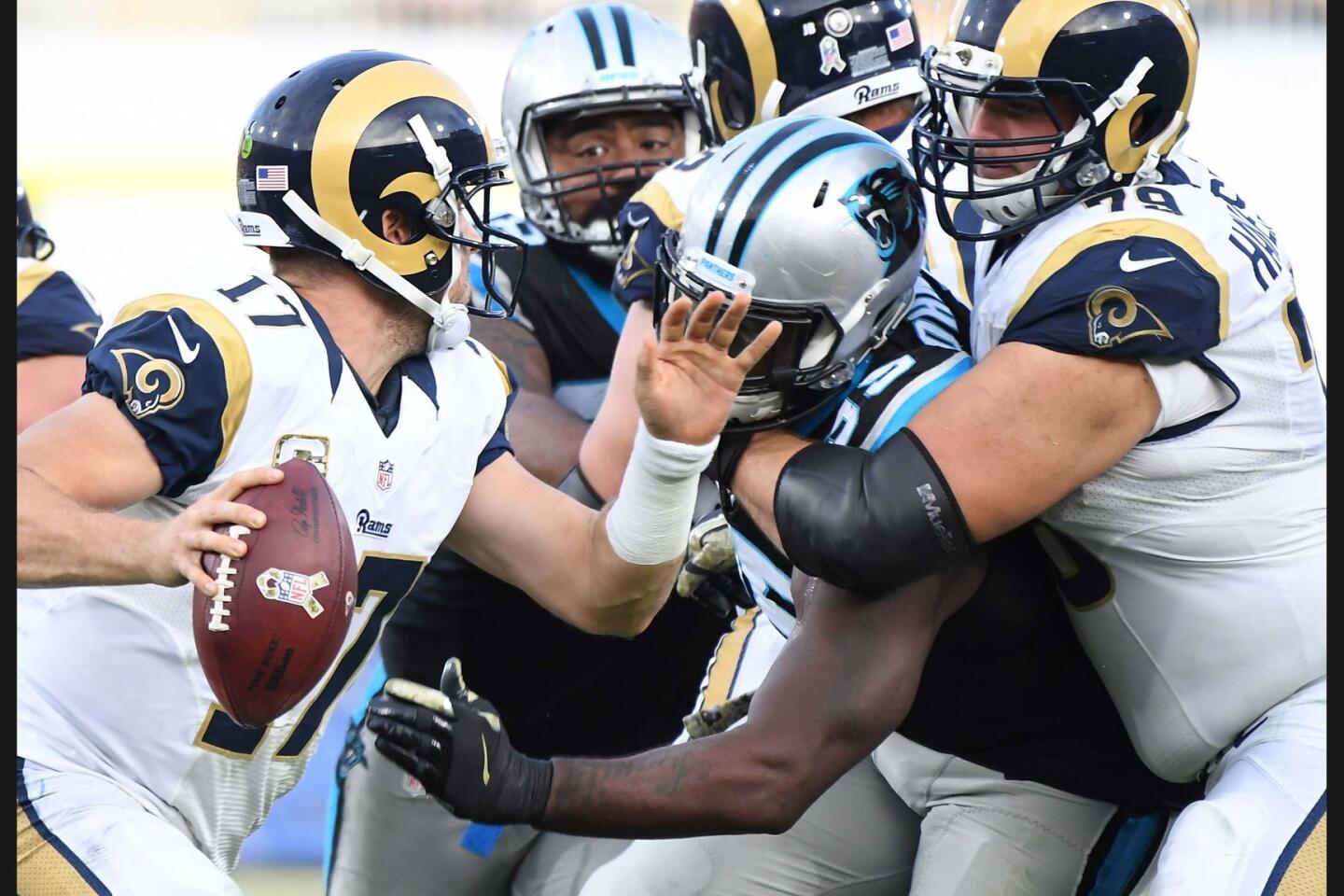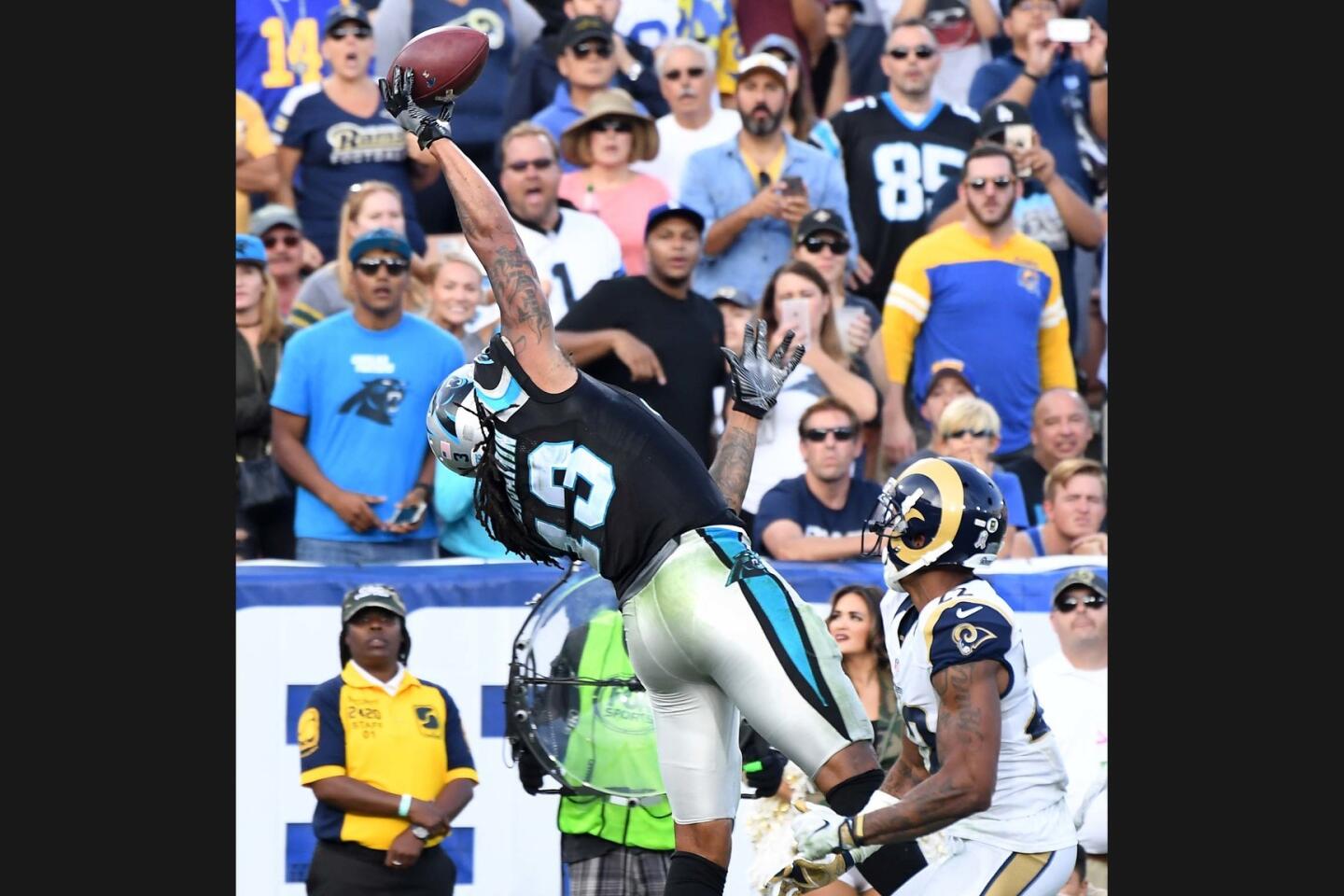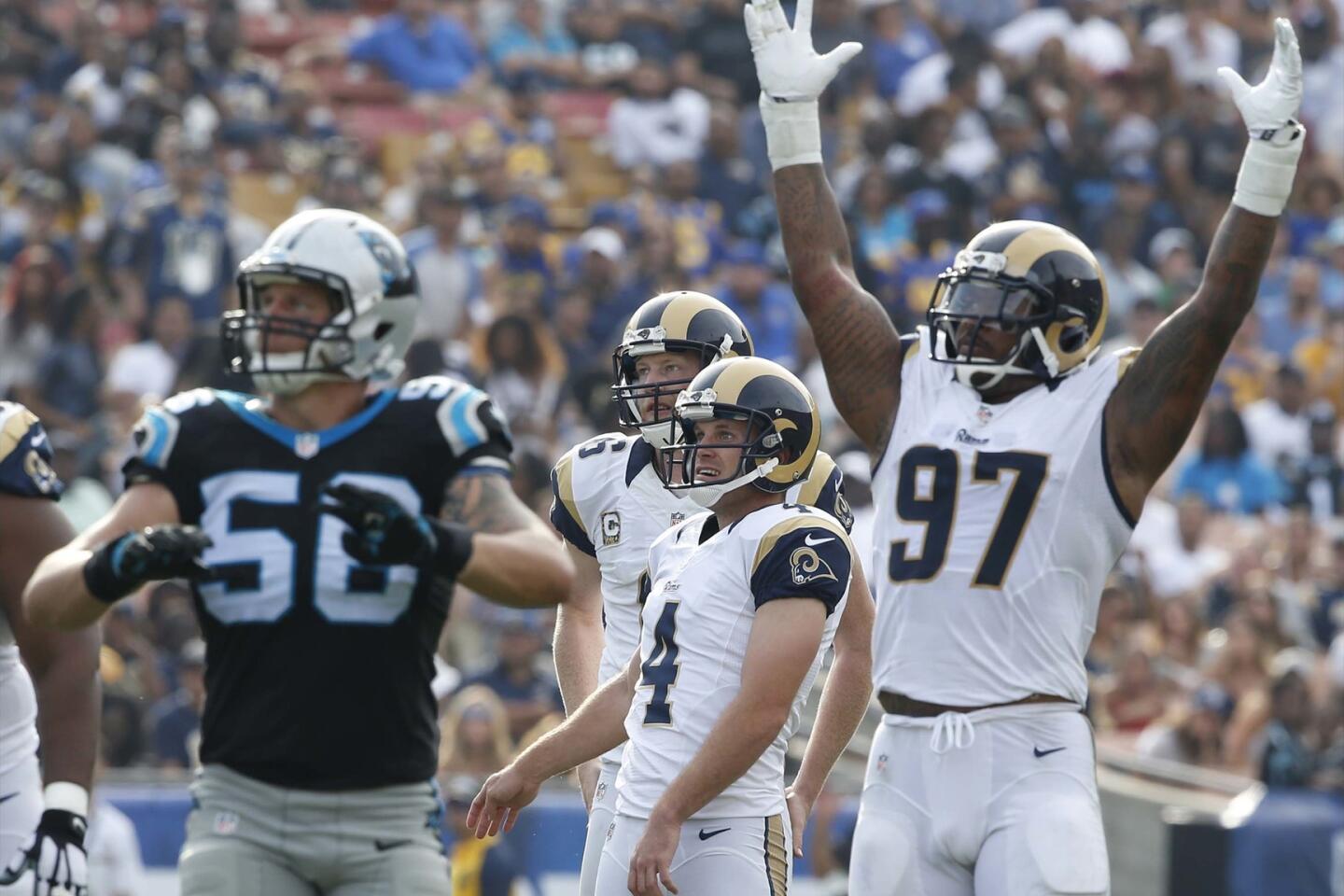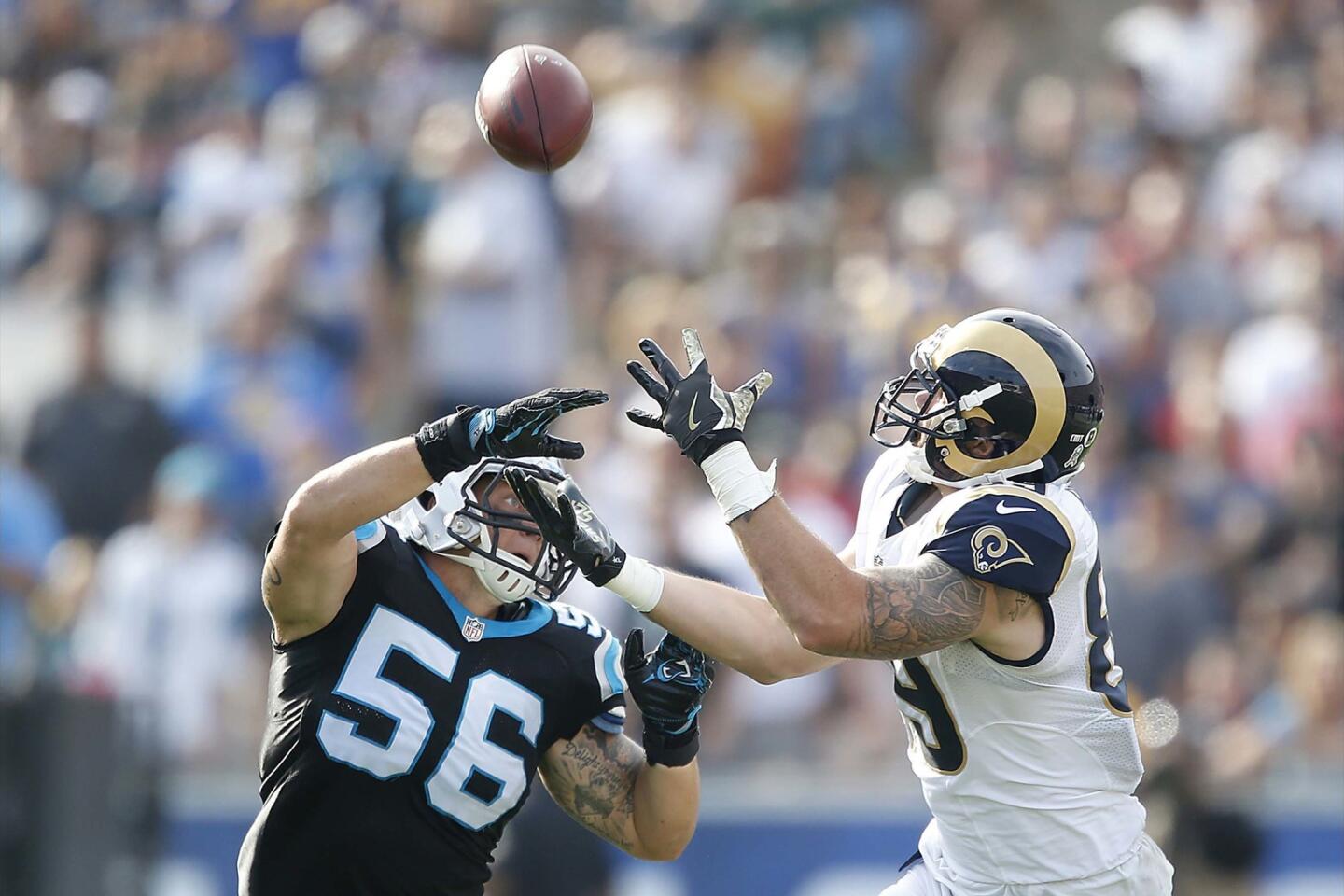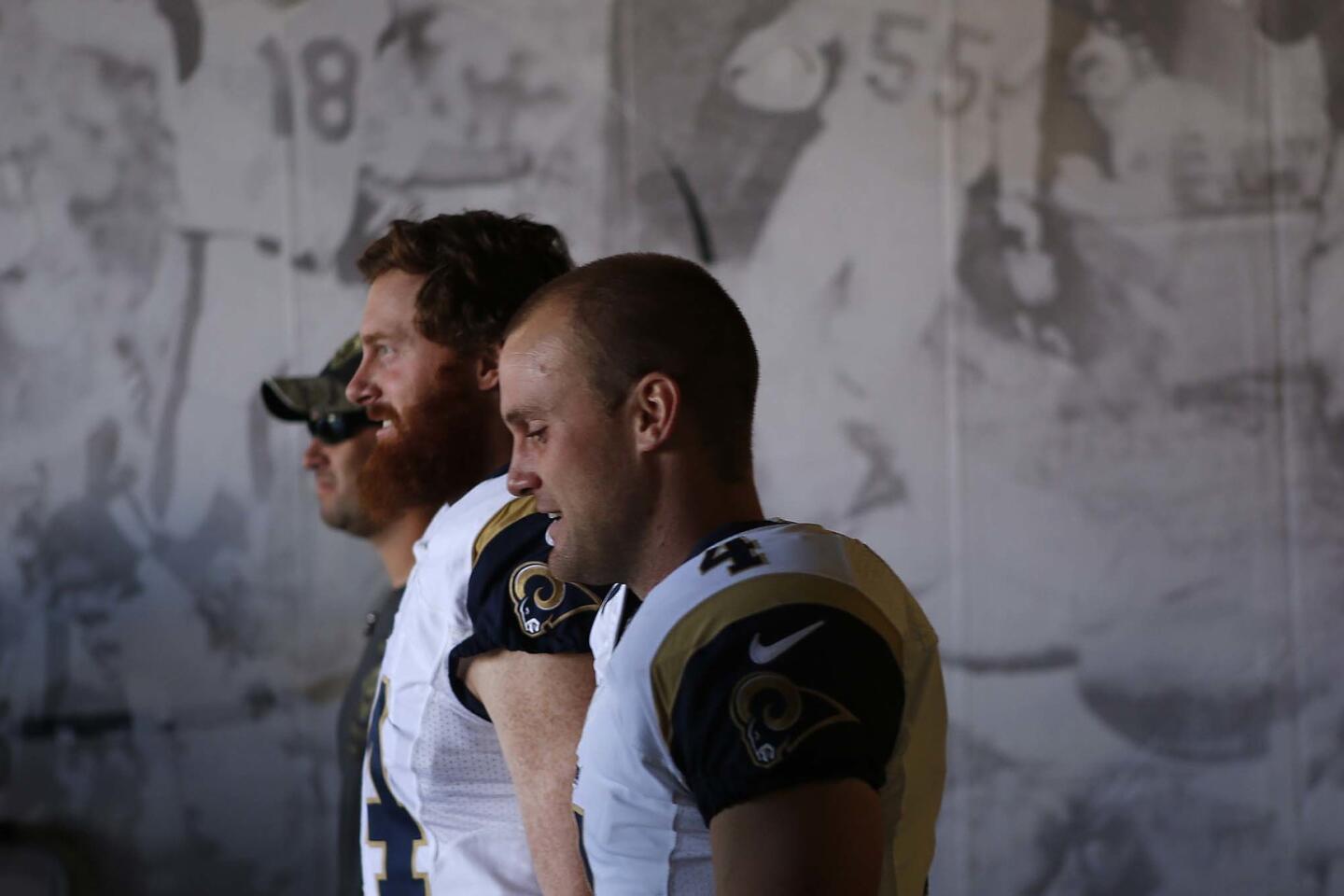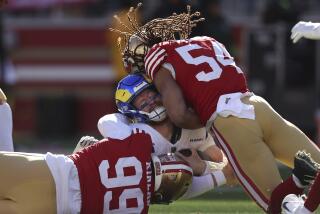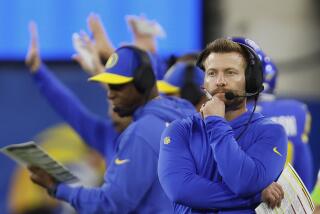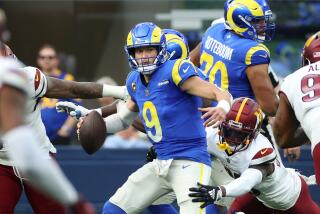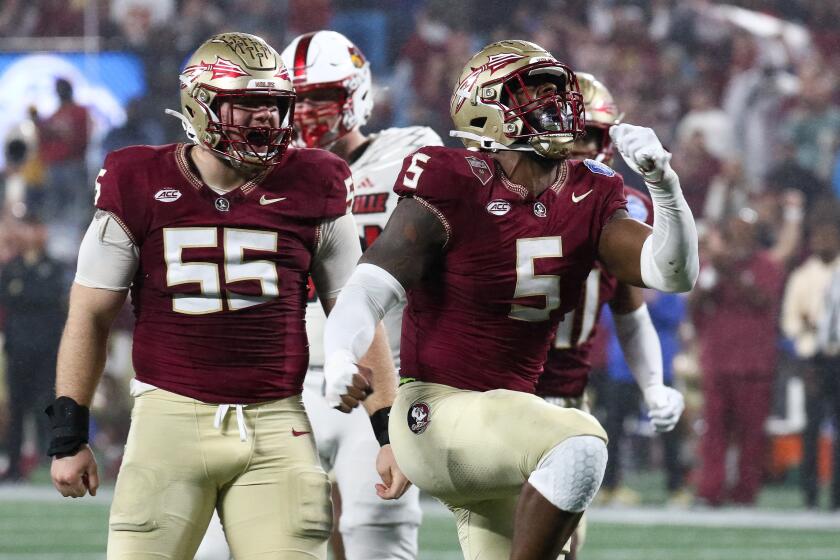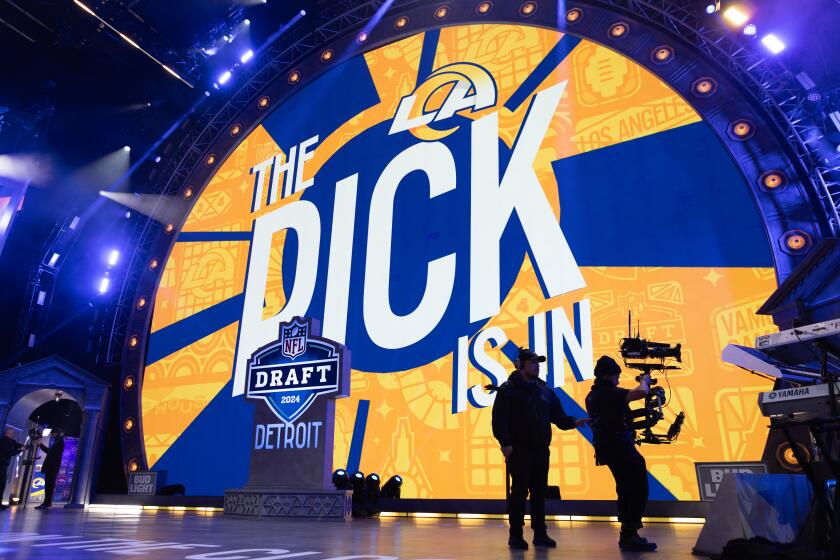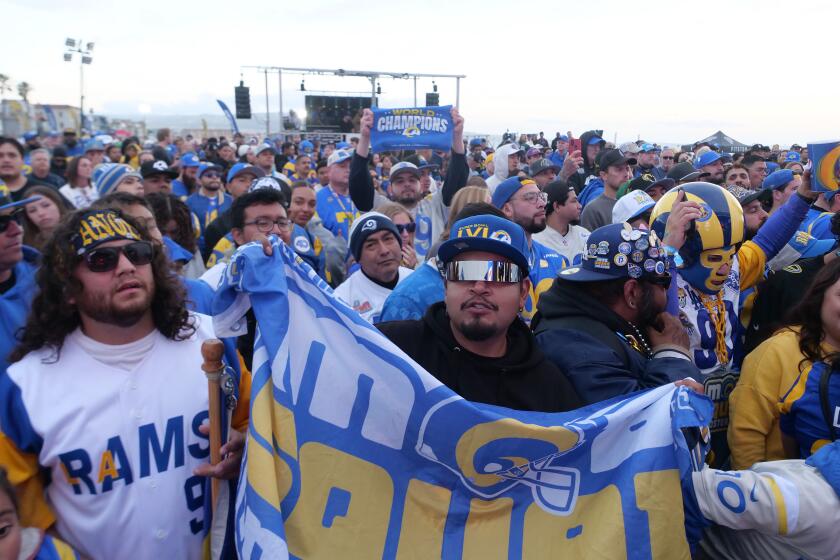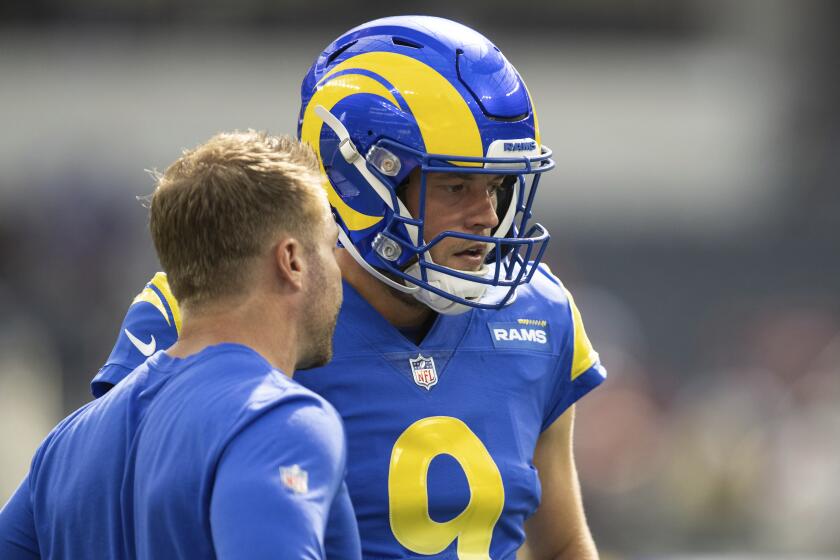The most penalized player in the NFL did not have a yellow flag thrown his way Sunday, which was great for Rams tackle Greg Robinson, who was beginning to think his reputation for being too “handsy” in 2014 and 2015 was the reason he has been called for multiple holding penalties in 2016.
The rest of the Rams did not get off so easy in a 13-10 loss to the Carolina Panthers in the Coliseum. Continuing a disturbing season-long trend, the Rams were penalized 10 times for 109 yards, costing them valuable yards on special teams, thwarting several drives and extending several Panthers drives.
“It’s definitely frustrating,” receiver and punt returner Tavon Austin said. “You can’t win a football game with a lot of penalties, and we’ve been getting them on all sides, at every position. We clean up those penalties, it’s a different ballgame.”
Though there were no glaring penalties the Rams could point to and say, “That one cost us the game,” there were several momentum-sapping calls. The 10 penalties tied a season high.
After Carolina quarterback Cam Newton connected with tight end Greg Olsen on a nine-yard touchdown pass for a 7-0 lead late in the first quarter, Benny Cunningham fielded the ensuing kickoff six yards deep in the end zone and raced toward the right sideline.
Cunningham then flipped the ball on a reverse to Cody Davis, who got a great block from Bradley Marquez and ran around the left side before getting tackled out of bounds near the 35-yard line.
But Eugene Sims was flagged for holding at the 19-yard line, a penalty that knocked the Rams back to their five-yard line.
“It’s taken the fun out of the game,” Sims said of the penalties. “I’m not pointing fingers or anything … but I don’t think that was a holding call. We’ll watch the film and turn it into [the NFL] if we feel it’s wrong.”
Cornerback Lamarcus Joyner’s pass-interference call on a third-and-12 play from the Carolina 11-yard line gave the Panthers a first down in the final minute of the first quarter.
The Rams fell to the Panthers, 13-10, for their fourth consecutive loss. Is it time for Jeff Fisher to insert Jared Goff at quarterback?
Austin returned a punt 22 yards to the Rams’ 48-yard line midway through the second quarter, giving a stagnant offense great field position, but an illegal-block-above-the-waist call on Chase Reynolds pushed the Rams back to the Carolina 35-yard line.
The defense committed two penalties — a five-yard neutral-zone infraction by end Robert Quinn and a 15-yard horse-collar-tackle by end William Hayes — on Carolina’s fourth-quarter drive that ended with a 37-yard Graham Gano field goal to give t the Panthers a 13-3 lead. A holding call by right tackle Rob Havenstein set the Rams back 10 yards on their touchdown-scoring drive late in the fourth quarter.
Tight end Lance Kendricks, who caught seven passes for 90 yards, said the Rams “did OK with the penalties today, I don’t think we really got out of hand, like we have in the past,” but that doesn’t minimize the problem.
The Rams entered Sunday ranked 14th in the NFL in penalty yardage and have been flagged 68 times for a loss of 588 yards, an average of 84 yards per game.
1/26
Rams tight end Tyler Higbee stretches out to catch, but misses, a pass in the end zone while he’s defended by Panthers linebacker Thomas Davis during the second half.
(Robert Gauthier / Los Angeles Times) 2/26
Rams cornerback Lamarcus Joyner, right, commits pass interference while defending Panthers receiver Devin Fuchess in the first quarter. (Wally Skalij / Los Angeles Times)
3/26
Rams quarterback Case Keenum is sacked by Panthers defensive tackle Mario Addison during the third quarter. (Robert Gauthier / Los Angeles Times)
4/26
Panthers safety Colin Jones dives to down a punt at the one-yard line during the first quarter.
(Robert Gauthier / Los Angeles Times) 5/26
Rams quarterback Case Keenum fumbles the ball as Panthers Thomas Davis hits him in the second quarter.
(Wally Skalij / Los Angeles Times) 6/26
Rams quarterback Case Keenum fumbles the ball after Panthers linebacker Thomas Davis hit him during the second quarter, but running back Benny Cunningham catches it.
(Wally Skalij / Los Angeles Times) 7/26
Panthers defensive backs James Bradberry, left, and Kurt Coleman, celebrate after preventing a long pass from Rams quarterback Case Keenum to receiver Brian Quick, left, late in the fourth quarter.
(Robert Gauthier / Los Angeles Times) 8/26
Rams tight end Tyler Higbee can’t hold on to a pass as he’s brought down by Panthers safety Tre Boston during the second half.
(Robert Gauthier / Los Angeles Times) 9/26
Rams cornerback E.J. Gaines, center, and linebacker Mark Barron try to bring down Panthers receiver Kelvin Benjamin during the second quarter.
(Wally Skalij / Los Angeles Times) 10/26
Rams running back Todd Gurley is taken down after a long run during the second quarter.
(Robert Gauthier / Los Angeles Times) 11/26
Panthers quarterback Cam Newton delights a young fan by tossing him the ball he threw for a touchdown to tight end Greg Olsen in the first quarter.
(Robert Gauthier / Los Angeles Times) 12/26
Rams receiver Kenny Britt catches a touchdown pass in front of Panthers James Bradberry for a 10-yard score late in the fourth quarter
(Wally Skalij / Los Angeles Times) 13/26
Panthers cornerback James Bradberry has position on Rams receiver Tavon Austin on a long pass from quarterback Case Keenum. The pass was incomplete.
(Robert Gauthier / Los Angeles Times) 14/26
Rams tight end Lance Kendricks misses a Case Keenum pass at the goal line at the Coliseum on Nov. 6 (Robert Gauthier / Los Angeles Times)
15/26
Rams tight end Lance Kendricks is upended by Panthers safety Michael Griffin after a short gain during the second half.
(Robert Gauthier / Los Angeles Times) 16/26
Rams backup quarteback Jared Goff watches from the sidelines during the second half.
(Wally Skalij / Los Angeles Times) 17/26
Rams running back Benny Cunningham eludes Panthers safety Kurt Coleman as tackle Greg Robinson tumbles nearby during second-quarter action.
(Robert Gauthier / Los Angeles Times) 18/26
Panthers linebacker Thomas Davis intercepts a pass in front of Rams receiver Tyler Higbee during the third quarter.
(Wally Skalij / Los Angeles Times) 19/26
Rams defensive lineman Aaron Donald sacks Panthers quarterback Cam Newton early in the fourth quarter. (Robert Gauthier / Los Angeles Times)
20/26
Panthers kicker Graham Gano hits a 37-yard field goal to give Carolina a 13-3 lead over the Rams midway through the fourth quarter.
(Robert Gauthier / Los Angeles Times) 21/26
Rams quarterback Case Keenum scrambles from the Panthers’ rush during the second quarter.
(Wally Skalij / Los Angeles Times) 22/26
Rams defensive lineman Eugene Sims, 97, and teammate Ethan Westbrooks celebrate after sacking Panthers quarterback Cam Newton during the second quarter.
(Robert Gauthier / Los Angeles Times) 23/26
Panthers receiver Kelvin Benjamin can’t make the catch in the end zone in front of Rams cornerback Trumaine Johnson in the fourth quarter.
(Wally Skalij / Los Angeles Times) 24/26
Rams kicker Greg Zuerlein twists his body as he misses a 55-yard field-goal attempt in the first quarter.
(Robert Gauthier / Los Angeles Times) 25/26
Rams tight end Tyler Higbee hauls in a 31-yard pass over Panthers linebacker A.J. Klein during first-half action.
(Robert Gauthier / Los Angeles Times) 26/26
Kicker Greg Zuerlein and long snapper Jake McQuaide walk past a mural of Rams players hours before their game against Panthers.
(Robert Gauthier / Los Angeles Times) Why have the Rams been penalized so much? Do the players lack discipline, making them prone to mistakes? Are the coaches at fault? Is fatigue a factor at times? And what can be done to reduce the number of yellow flags?
There are no easy answers.
“You can’t eliminate them,” Sims said. “It’s a physical game, a contact sport, and things happen. I really couldn’t tell you if they can be coached out of us, because it could be a bad call at the same time.”
Austin said the Rams need to be more disciplined on offense, defense and special teams.
“You have to be in the right spot at the right time,” he said. “We have to train a little harder and be smarter.”
mike.digiovanna@latimes.com
Twitter: @MikeDiGiovanna
